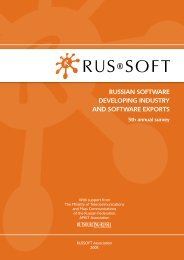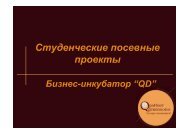russian software developing industry and software exports
russian software developing industry and software exports
russian software developing industry and software exports
You also want an ePaper? Increase the reach of your titles
YUMPU automatically turns print PDFs into web optimized ePapers that Google loves.
Chapter 6.<br />
Human Resources <strong>and</strong> the Labor Market Situation<br />
Perm (5th place), Vladislav Isenbayev (7th place) <strong>and</strong><br />
the coach of the SPbGU ITMO team Andrei Stankevich<br />
(8th place).<br />
In the «Marathon» category of the last TopCoder<br />
contest the winner was Andrei Lopatin, twice world<br />
champion with the team of St. Petersburg State<br />
University in 2000 <strong>and</strong> 2001 <strong>and</strong> now its coach. The<br />
4th place in the «Marathon» was taken by Dmitry<br />
Trofimov, fifth-year student of SPbGU ITMO.<br />
In recent years the competition of Russia <strong>and</strong> China<br />
in programming contests is becoming increasingly<br />
tough. It is representatives of these two countries<br />
who become champions or prize-winners. Still<br />
Russian students have a small advantage, but recently<br />
Chinese universities have made a big breakthrough in<br />
educating top-level programmers.<br />
Unfortunately, successful performance of Russians<br />
in international programming contests creates an<br />
illusion among Russian officials of absolute wellbeing<br />
in the field of staff training. Actually, IT <strong>industry</strong><br />
representatives have lots of claims to Russian higher<br />
education institutes that are very slow to adapt their<br />
programs to market requirements. In many respects<br />
these claims result from the activity of the Ministry of<br />
Education <strong>and</strong> Science <strong>and</strong> the RF Government.<br />
Officials either ignore or react with great delay<br />
to proposals of <strong>industry</strong> representatives concerning<br />
relevant changes to be introduced in the system of<br />
professional training. Therefore, companies have to<br />
actively cooperate with universities, spending much<br />
money on elimination of drawbacks of the state<br />
education system.<br />
The increase by 40,000 of budget places in<br />
state universities to train IT specialists since 2008<br />
is a positive sign, but these measures should have<br />
been taken 5 years ago. The same holds true for<br />
preparation of “Professional St<strong>and</strong>ards in the Field of<br />
Information Technologies” developed at the initiative<br />
of the Ministry of Information <strong>and</strong> Communications<br />
<strong>and</strong> Association APKIT <strong>and</strong> presented in April 2008.<br />
The progress of Chinese universities should change<br />
the attitude of Russian officials. Chinese students have<br />
already started serious competition with Russians in<br />
team programming, while Chinese companies do the<br />
same on the world market of <strong>software</strong> development<br />
services. Certain methods to support education <strong>and</strong><br />
the <strong>software</strong> <strong>industry</strong> may be borrowed from the<br />
Chinese Government.<br />
STAFF TURNOVER<br />
The indicator of staff turnover remains at the<br />
low level. At year-end 2008 it made 9% (i.e. equal<br />
to 2007). Low staff turnover rate is one of Russia’s<br />
competitive advantages on the global market of<br />
outsourcing services. In India, a world leader of IT<br />
outsourcing, this indicator is much higher reaching<br />
30% <strong>and</strong> more.<br />
Although the average staff turnover in Russian<br />
companies is similar to the previous year, the<br />
measurements for different groups of companies<br />
prove that major changes have taken place. First, it<br />
should be noted that at year-end 2007 in companies<br />
with a turnover less than 4 MUSD this indicator was<br />
much higher than in larger companies (21% against<br />
1.5-2%). Such difference showed major transfer of<br />
human resources from small companies to large<br />
enterprises.<br />
Given the fact that at year-end 2008 the staff<br />
turnover rate equaled (it even slightly increased<br />
in major companies) mass transfer of employees<br />
from small companies to major businesses stopped.<br />
Last year staff turnover was mainly caused by staff<br />
reduction rather than manpower transfer between<br />
companies. If dismissed specialists were in dem<strong>and</strong>,<br />
as a rule they were employed to replace lower-level<br />
employees. Hence, the rotation, which allowed to<br />
improve the average level of qualification without<br />
changing company staff.<br />
Staff turnover is lower in the regions (in «Other<br />
cities» it makes 7%) <strong>and</strong> higher in St. Petersburg<br />
(13%) <strong>and</strong> Moscow (9%), the difference being very<br />
insignificant.<br />
There is no marked interdependence between<br />
staff turnover <strong>and</strong> export share in total revenue.<br />
However, companies working mainly on the Russian<br />
market more often said they feel a negative influence<br />
of the crisis, their staff turnover rate is the same as in<br />
companies earning the larger part of their revenues in<br />
external markets.<br />
12%<br />
10%<br />
8%<br />
6%<br />
4%<br />
2%<br />
0%<br />
SALARIES<br />
Annual index of staff turnover by size of companies<br />
7%<br />
up to 0.5 MUSD<br />
6%<br />
from 0.5 MUSD<br />
to 4 MUSD<br />
11%<br />
from 4 MUSD<br />
to 20 MUSD<br />
10%<br />
over 20 MUSD<br />
The average salary of key specialists working for<br />
Russian export <strong>software</strong> companies has decreased<br />
for the first time in many years. In all previous years<br />
RUSSOFT Association’s survey showed not merely<br />
its growth but rather a rapid increase – by 30-50%<br />
annually in dollar equivalent. Only in 2007–2008<br />
(before the crisis) the growth was reduced, <strong>and</strong> the<br />
average salary in dollars increased mainly owing to<br />
the Russian ruble strengthening during that period.<br />
According to recruitment agencies, the salary of<br />
<strong>software</strong> developers earned in rubles was steadily<br />
54








